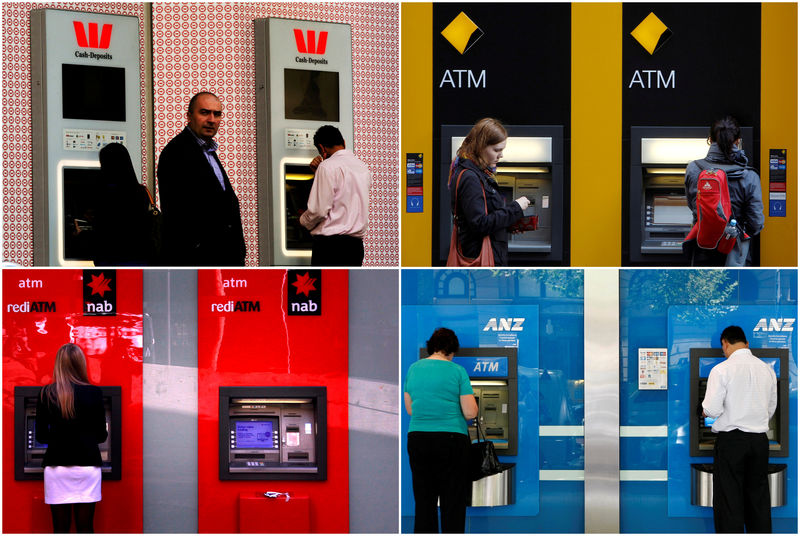By Paulina Duran and Byron Kaye
SYDNEY (Reuters) - Investors are shorting second-tier Australian banks while the majors enjoy their biggest rally in three years, as the market weighs up the long-term impact of a public inquiry that exposed widespread misconduct in the financial sector last year.
The capital shift shows investors believe higher regulatory costs will hurt smaller lenders more than the big four market leaders, whose business models - if not their reputations - emerged largely unscathed from the year-long inquiry.
Short bets on regional lenders Bendigo and Adelaide Bank (AX:BEN) and Bank of Queensland (AX:BOQ) spiked over a fifth in the weeks since the inquiry delivered its final report on Feb. 1, Refinitiv data shows. Their shares had already fallen about 15 percent in the same period.
Investors are instead putting money on the larger banks' ability to safeguard profitability in an environment of record low mortgage growth and falling house prices.
"The regional banks will struggle to compete with the major banks," said Azib Khan, from stockbroker Morgans Financial Ltd.
As the government-backed independent inquiry known as a Royal Commission continued through most of 2018, analysts feared it would result in anything from enforced divestments to strict controls over how much a bank could lend. But its final recommendations focused mostly on cultural changes, sparing the big lenders the prospect of tougher laws.
The inquiry wiped A$72 billion ($51 billion) from the combined valuation of the top four banks - Australia and New Zealand Banking Group (AX:ANZ), Commonwealth Bank of Australia (AX:CBA), National Australia Bank (AX:NAB) and Westpac Banking Corp (AX:WBC) - from its February 2018 start to the last trading week of 2018, amid constant headlines about fee-gouging, cavalier sales tactics and poor governance.
Since then, their shares have clawed back A$50 billion. The country's biggest lender, Commonwealth Bank, is now only 4 percent below its pre-inquiry level. ANZ's shares have risen 12 percent in the four weeks since the inquiry delivered its final report last month, their biggest one-month leap since March 2016 and within 5 percentage points of full recovery.
While the inquiry found the smaller lenders generally had behaved better than their bigger rivals, they have suffered sharper falls in lending growth and profitability in the wake of the Royal Commission.
"It's harder for them to absorb the extra regulatory costs, and they have a lower credit rating than the majors and that means that they've got a higher cost of funding," Khan said.
Recent updates from Bank of Queensland and Bendigo included the banks' expectations of higher regulatory costs, highlighting the disadvantages of the smaller lenders.
With home loan growth of just 1 percent during the first half of the financial year, Bendigo reported below-expectation profit and flagged higher regulatory spending in the second half. Bank of Queensland also flagged lower half-yearly earnings and warned the second half of the year would be challenging.
"The increase in compliance costs and expensive funding will affect the smaller banks more than the larger banks," said Sean Sequeira, chief investment officer at Alleron Investment Management.
Sequeira said that while his fund did not hold short positions in the banks, he agreed with the short call on Bendigo.
"They have a portfolio of reverse mortgages that leaves them with a larger exposure to property than banks with standard loan portfolios, which concerns us given the current weakness in housing."

($1 = 1.4148 Australian dollars)